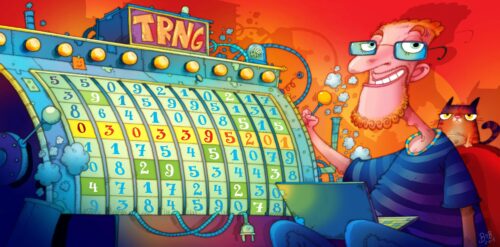The RNG is from the science that guarantees a fair game when you’re playing Video Poker and Keno.
For video poker and Keno players, the Random Number Generator (RNG) is the invisible engine driving every hand and draw. It’s not just a tech buzzword—it’s the backbone of modern gaming machines, tied to casino chips, regulatory oversight, and a history of ensuring fairness. But misconceptions persist. Let’s break it down with a clear lens, separating fact from fiction.
Chips and RNG: The Mechanics
In a casino, your chips buy you a shot at the RNG’s output. Unlike mechanical slots of the past, today’s video poker and Keno machines don’t rely on physical reels or balls. Instead, an RNG—a microchip running a complex algorithm—generates numbers at lightning speed, often hundreds per second. When you press “deal” or “play,” the system locks onto the latest number, mapping it to cards or Keno spots. According to Casino Tips by 888 Casino, “The RNG operates 24/7, producing values between 0 and roughly 4 billion,” a range so vast it mimics true randomness. This isn’t a payout timer; it’s a continuous, impartial process.
Misconception: Machines Control Wins
Players often assume a machine “decides” when to pay, as if it’s programmed to tighten up after a jackpot. In reality, RNGs are stateless—they don’t track your wins or losses. The payout percentage (e.g., 95% for video poker) is set by the casino’s software, not the RNG itself. Gambling With An Edge clarifies, “Payouts are determined by the game’s design, not the RNG’s whims.” Enforcement comes from gaming commissions—like Nevada’s Gaming Control Board—which test RNG to ensure they meet statistical randomness standards, protecting players from rigged odds.
History and Fairness
RNG evolved from the 1980s, when casinos swapped mechanical systems for digital precision. Early skepticism led to strict rules: chips spent must translate to fair outcomes. Today, third-party labs (e.g., GLI or iTech Labs) certify RNGs, verifying they’re “pseudo-random”—based on algorithms seeded with unpredictable inputs like system clocks. This isn’t chaos; it’s controlled unpredictability, audited to match the game’s stated odds.
Reality Check
No machine is “due” for a win, and Keno patterns don’t predict the next draw. The RNG resets with every play, indifferent to your chip stack or strategy. At themagicgambler.com, we lean on this science—practice it free at videopoker.com [affiliate link]—because understanding RNGs sharpens your edge. Fairness isn’t magic; it’s math, enforced by rules and history.
Ready to play some free demo, no gambling, Video Poker and Keno?

